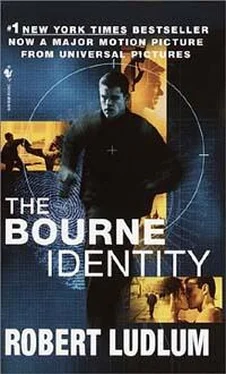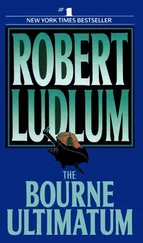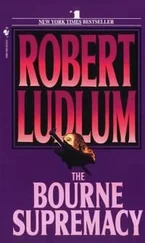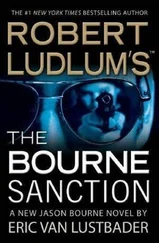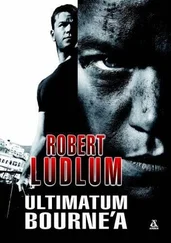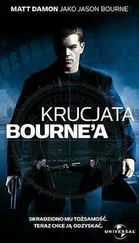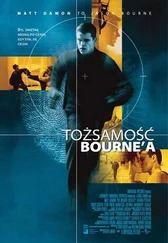“I want him,” whispered the silhouette. “He was never real, and that’s his crime against me. Tell the old men that if any find him, get word to Parc Monceau but do nothing. Keep him in sight, but do nothing! I want him alive on the twenty-fifth of March. On March 25 I’ll execute him myself and deliver his body to the Americans.”
“The word will go out immediately.”
“Angelus Domini, child of God.”
“Angelus Domini,” said the beggar.
The old soldier walked in silence beside the younger man down the moonlit path in the Bois de Boulogne. Neither spoke, for too much had already been said—admitted, challenged, denied and reaffirmed. Villiers had to reflect and analyze, to accept or violently reject what he had heard. His life would be far more bearable if he could strike back in anger, attack the lie and find his sanity again.
But he could not do that with impunity; he was a soldier and to turn away was not in him.
There was too much truth in the younger man. It was in his eyes, in his voice, in his every gesture that asked for understanding. The man without a name was not lying. The ultimate treason was in Villiers’ house. It explained so many things he had not dared to question before. An old man wanted to weep.
For the man without a memory there was little to change or invent; the chameleon was not called upon. His story was convincing because the most vital part was based in the truth. He had to find Carlos, learn what the assassin knew; there would be no life for him if he failed. Beyond this he would say nothing. There was no mention of Marie St. Jacques, or the Ile de Port Noir, or a message being sent by person or persons unknown, or a walking hollow shell that might or might not be someone he was or was not—who could not even be sure that the fragments of memories he possessed were really his own. None of this was spoken of.
Instead, he recounted everything he knew about the assassin called Carlos. That knowledge was so vast that during the telling Villiers stared at him in astonishment, recognizing information he knew to be highly classified, shocked at new and startling data that was in concert with a dozen existing theories, but to his ears never before put forth with such clarity. Because of his son, the general had been given access to his country’s most secret files on Carlos, and nothing in those records matched the younger man’s array of facts.
“This woman you spoke with in Argenteuil, the one who calls my house, who admitted being a courier to you …”
“Her name is Lavier,” Bourne interrupted.
The general paused. “Thank you. She saw through you; she had your photograph taken.”
“Yes.”
“They had no photograph before?”
“No.”
“So as you hunt Carlos, he in turn hunts you. But you have no photograph; you only know two couriers, one of which was at my house.”
“Yes.”
“Speaking with my wife.”
“Yes.”
The old man turned away. The period of silence had begun.
They came to the end of the path, where there was a miniature lake. It was bordered with white gravel, benches spaced every ten to fifteen feet, circling the water like a guard of honor surrounding a grave of black marble. They walked to the second bench. Villiers broke his silence.
“I should like to sit down,” he said. “With age there comes a paucity of stamina. It often embarrasses me.”
“It shouldn’t,” said Bourne, sitting down beside him.
“It shouldn’t,” agreed the general, “but it does.” He paused for a moment, adding quietly, “Frequently in the company of my wife.”
“That’s not necessary,” said Jason.
“You mistake me.” The old man turned to the younger, “I’m not referring to the bed. There are simply times when I find it necessary to curtail activities—leave a dinner party early, absent myself on weekends to the Mediterranean, or decline a few days on the slopes in Gstaad.”
“I’m not sure I understand.”
“My wife and I are often apart. In many ways we live quite separate lives, taking pleasure, of course, in each other’s pursuits.”
“I still don’t understand.”
“Must I embarrass myself further?” said Villiers. “When an old man finds a stunning young woman anxious to share his life, certain things are understood, others not so readily. There is, of course, financial security and in my case a degree of public exposure. Creature comforts, entry into the great houses, easy friendship with the celebrated; it’s all very understandable. In exchange for these things, one brings a beautiful companion into his home, shows her off among his peers—a form of continuing virility, as it were. But there are always doubts.” The old soldier stopped for several moments; what he had to say was not easy for him. “Will she take a lover?” he continued softly. “Does she long for a younger, firmer body, one more in tune with her own? If she does, one can accept it—even be relieved, I imagine—hoping to God she has the sense to be discreet. A cuckolded statesman loses his constituency faster than a sporadic drunk; it means he’s fully lost his grip. There are other worries. Will she abuse his name? Publicly condemn an adversary whom one is trying to convince? These are the inclinations of the young; they are manageable, part of the risks in the exchange. But there is one underlying doubt that if proved justified cannot be tolerated. And that is if she is part of a design. From the beginning.”
“You’ve felt it then?” asked Jason quietly.
“Feelings are not reality!” shot back the old soldier vehemently. “They have no place in observing the field.”
“Then why are you telling me this?”
Villiers’ head arched back, then fell forward, his eyes on the water. “There could be a simple explanation for what we both saw tonight. I pray there is, and I shall give her every opportunity to provide it.” The old man paused again. “But in my heart I know there isn’t. I knew it the moment you told me about Les Classiques. I looked across the street, at the door of my house, and suddenly a number of things fell painfully into place. For the past two hours I have played the devil’s advocate; there is no point in continuing. There was my son before there was this woman.”
“But you said you trusted her judgment. That she was a great help to you.”
“True. You see, I wanted to trust her, desperately wanted to trust her. The easiest thing in the world is to convince yourself that you’re right. As one grows old it is easier still.”
“What fell into place for you?”
“The very help she gave me, the very trust I placed in her.” Villiers turned and looked at Jason.
“You have extraordinary knowledge about Carlos. I’ve studied those files as closely as any man alive, for I would give more than any man alive to see him caught and executed, I alone the firing squad.
And as swollen as they are, those files do not approach what you know. Yet your concentration is solely on his kills, his methods of assassination. You’ve overlooked the other side of Carlos. He not only sells his gun, he sells a country’s secrets.”
“I know that,” Bourne said. “It’s not the side—”
“For example,” continued the general, as if he had not heard Jason. “I have access to classified documents dealing with France’s military and nuclear security. Perhaps five other men—all above suspicion—share that access. Yet with damning regularity we find that Moscow has learned this, Washington that, Peking something else.”
“You discussed those things with your wife?” asked Bourne, surprised.
“Of course not. Whenever I bring such papers home, they are placed in a vault in my office. No one may enter that room except in my presence. There is only one other person who has a key, one other person who knows the whereabouts of the alarm switch. My wife.”
Читать дальше
